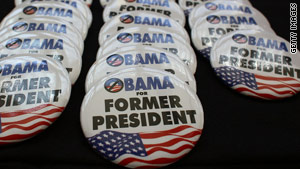
First on CNN: Florida will likely hold Jan. primary, threatening presidential calendar

- Florida will likely move primary date to Jan. 31
- Traditional early states would then be forced to leapfrog their dates into early January
- Republican leadership could penalize Florida by limiting delegates seated at convention
Washington (CNN) -- Florida is now expected to hold its presidential primary on the last day in January 2012, a move likely to throw the carefully arranged Republican nominating calendar into disarray and jumpstart the nominating process a month earlier than party leaders had hoped.
Florida House Speaker Dean Cannon told CNN on Tuesday that a state commission exploring potential primary dates is likely to choose January 31 to hold the nominating contest.
If that happens, it would almost certainly force the traditional early states of Iowa, New Hampshire, South Carolina and Nevada to leapfrog Florida and move their primaries and caucuses into early- to mid-January.
"We are expecting to meet on Friday from 11 to 12, and I expect that they will pick January 31 as Florida's primary date," said Cannon, who helped select members of the nine-member commission.
States are required to submit the dates of their primary and caucuses to the Republican National Committee no later than Saturday, but most states are expected to choose their dates by the close of business Friday.
Florida's move would directly violate RNC rules that forbid any state other than the first four "carve-out" states -- Iowa, New Hampshire, Nevada and South Carolina -- from holding a primary before March 6.
States that ignore the RNC rules are subject to losing half of their delegates -- party representatives who ultimately choose the nominee -- to the Republican National Convention in Tampa, Florida, next August.
RNC Chairman Reince Priebus and other GOP officials have been aggressively lobbying Florida Gov. Rick Scott and state legislative leaders to move the primary back to February 21 in a last-ditch effort to protect the integrity of the nominating calendar, sources told CNN.
Even under the February 21 scenario, Florida would still lose half of its delegates.
But the proposal would allow Florida to go fifth on the calendar -- a coveted position that the state held in 2008 and hopes to hold again in 2012.
A February 21 contest for Florida would also protect the first four states from having to move their contests to January.
But members of the Florida commission remain wary of states like Colorado, Georgia and Missouri, which are threatening to hold primaries or caucuses before February 21.
Florida's likely decision is expected to trigger a flood of calendar moves as other states look to shore up their relevance in the presidential nominating process.
Iowa, New Hampshire, Nevada and South Carolina are almost certain to move up in order to defend their cherished early voting status.
"If Florida decides to go in January, they blow the RNC planned calendar wide open and we'll be back to campaigning over the holidays as Iowa and New Hampshire hold their presidential caucus and primary in early January," said Michigan National Committee member Saul Anuzis, who is on the RNC's presidential nominating schedule committee.
Michigan is holding its primary on February 28, which is after the first four states but still in violation of RNC rules.
Iowa has vowed to go before any other state in the process, meaning that the caucuses could be held in the early days of January, ensuring that the Republican candidates and their campaigns would likely be spending part of the holiday season in the hotel rooms of Des Moines.
New Hampshire, whose Secretary of State Bill Gardner holds the power to set the date of the first-in-the-nation primary, will follow suit.
Nevada and South Carolina are also likely to move in order to stay ahead of Florida.
South Carolina GOP Chairman Chad Connelly said the Republican Party respects "the rule of law" and called on other states to respect the calendar rules that were laid out by RNC officials in 2010.
Connelly said that if Florida moves into January, it would provoke a stampede to the front of the line as each state tries to maximize its influence in the process.
"If Florida moves, it would create chaos," Connelly said "The calendar would be so compressed that the states that are trying to more relevant, that I don't think it would do any good for them."